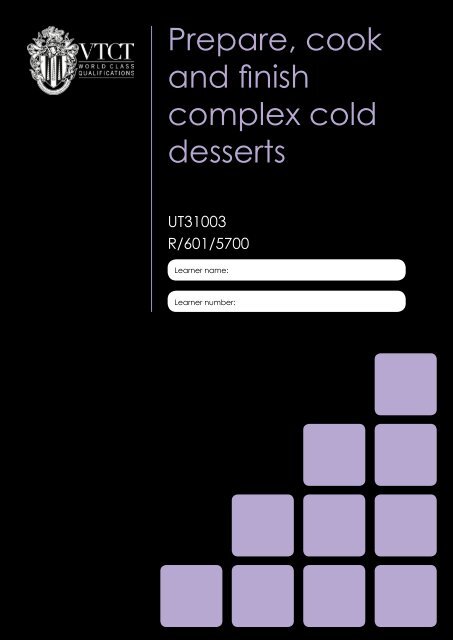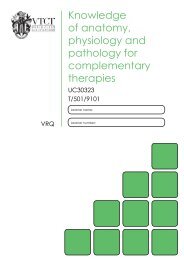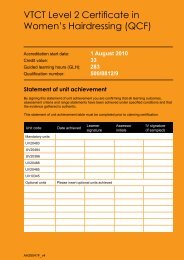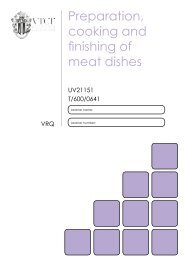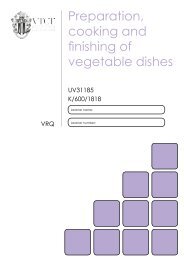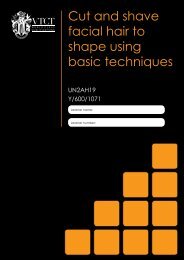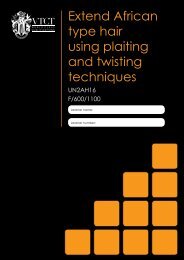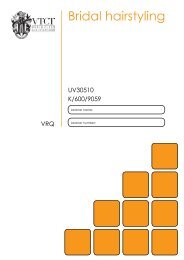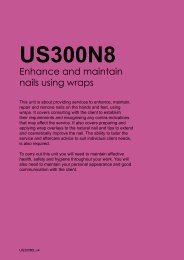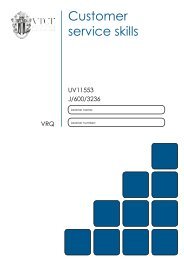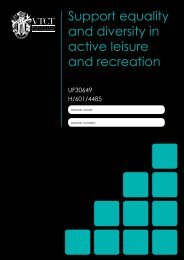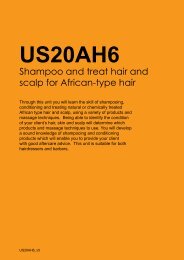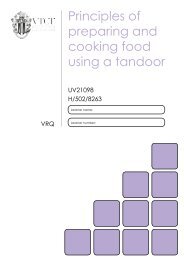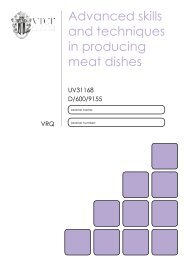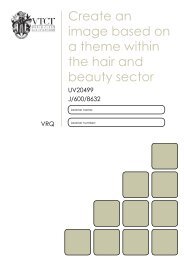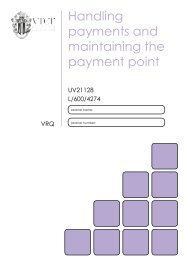Prepare, cook and finish complex cold desserts - VTCT
Prepare, cook and finish complex cold desserts - VTCT
Prepare, cook and finish complex cold desserts - VTCT
You also want an ePaper? Increase the reach of your titles
YUMPU automatically turns print PDFs into web optimized ePapers that Google loves.
<strong>Prepare</strong>, <strong>cook</strong><br />
<strong>and</strong> <strong>finish</strong><br />
<strong>complex</strong> <strong>cold</strong><br />
<strong>desserts</strong><br />
UT31003<br />
R/601/5700<br />
Learner name:<br />
Learner number:
Statement of unit achievement<br />
By signing this statement of unit achievement you are confirming that all learning outcomes, assessment<br />
criteria <strong>and</strong> range statements have been achieved under specified conditions <strong>and</strong> that the evidence<br />
gathered is authentic.<br />
This statement of unit achievement table must be completed prior to claiming certification.<br />
Unit code Date achieved Learner signature<br />
Assessor tracking table<br />
<strong>VTCT</strong> is the specialist awarding body for the Hairdressing, Beauty Therapy, Complementary Therapy,<br />
Hospitality <strong>and</strong> Catering <strong>and</strong> Sport <strong>and</strong> Active Leisure sectors, with over 45 years of experience.<br />
<strong>VTCT</strong> is an awarding body regulated by national organisations including Ofqual, SQA, DfES <strong>and</strong> CCEA.<br />
<strong>VTCT</strong> is a registered charity investing in education <strong>and</strong> skills but also giving to good causes in the area<br />
of facial disfigurement.<br />
Assessor name Assessor signature<br />
Assessor<br />
initials<br />
Assessors<br />
initials<br />
IV signature<br />
(if sampled)<br />
All assessors using this Record of Assessment book must complete this table. This is required for<br />
verification purposes.<br />
Assessor number<br />
(optional)
UT31003<br />
<strong>Prepare</strong>, <strong>cook</strong> <strong>and</strong> <strong>finish</strong><br />
<strong>complex</strong> <strong>cold</strong> <strong>desserts</strong><br />
The aim of this unit is to develop your knowledge,<br />
underst<strong>and</strong>ing <strong>and</strong> practical skills for preparing, <strong>cook</strong>ing,<br />
processing <strong>and</strong> <strong>finish</strong>ing <strong>complex</strong> <strong>cold</strong> <strong>desserts</strong> such as,<br />
mousses, cheesecake, ice cream <strong>and</strong> meringue.<br />
UT31003_v7
NOS<br />
3FPC13<br />
Level<br />
Credit value<br />
GLH<br />
3<br />
3<br />
30<br />
Observation(s)<br />
2<br />
External paper(s)<br />
0
<strong>Prepare</strong>, <strong>cook</strong> <strong>and</strong> <strong>finish</strong><br />
<strong>complex</strong> <strong>cold</strong> <strong>desserts</strong><br />
Learning outcomes<br />
On completion of this unit you will:<br />
1. Be able to prepare <strong>complex</strong> <strong>cold</strong> <strong>desserts</strong><br />
2. Be able to <strong>cook</strong> <strong>complex</strong> <strong>cold</strong> <strong>desserts</strong><br />
3. Be able to <strong>finish</strong> <strong>complex</strong> <strong>cold</strong> <strong>desserts</strong><br />
4. Underst<strong>and</strong> how to prepare <strong>complex</strong> <strong>cold</strong><br />
<strong>desserts</strong><br />
5. Underst<strong>and</strong> how to <strong>cook</strong> <strong>complex</strong> <strong>cold</strong><br />
<strong>desserts</strong><br />
6. Underst<strong>and</strong> how to <strong>finish</strong> <strong>complex</strong> <strong>cold</strong><br />
<strong>desserts</strong><br />
Evidence requirements<br />
1. Environment<br />
Evidence for this unit should be gathered<br />
within the workplace, however, you may<br />
be assessed within an approved realistic<br />
working environment (RWE) that meets<br />
People 1st’s criteria.<br />
2. Simulation<br />
Simulation is not allowed in this unit.<br />
3. Observation outcomes<br />
Competent performance of Observation<br />
outcomes must be demonstrated on<br />
at least two occasions. Assessor<br />
observations, witness testimonies <strong>and</strong><br />
products of work are likely to be the most<br />
appropriate sources of performance<br />
evidence. Professional discussion may be<br />
used as supplementary evidence for those<br />
criteria that do not naturally occur.<br />
Assessed observations should not be<br />
carried out on the same day for the<br />
same learning outcome. There should be<br />
sufficient time between assessments for<br />
reflection <strong>and</strong> personal development.<br />
You need to meet the same st<strong>and</strong>ard on a<br />
regular <strong>and</strong> consistent basis. Separating<br />
the assessments by a period of at least two<br />
weeks is recommended as competence<br />
must be demonstrated on a consistent <strong>and</strong><br />
regular basis.<br />
4. Range<br />
All ranges must be competently<br />
demonstrated as part of an assessed<br />
observation.<br />
5. Knowledge outcomes<br />
There must be evidence that you possess<br />
all the knowledge <strong>and</strong> underst<strong>and</strong>ing<br />
listed in the Knowledge section of this<br />
unit. In most cases this can be done<br />
by professional discussion <strong>and</strong>/or oral<br />
questioning. Other methods, such as<br />
projects, assignments <strong>and</strong>/or reflective<br />
accounts may also be used.<br />
6. Tutor/Assessor guidance<br />
You will be guided by your tutor/assessor<br />
on how to achieve learning outcomes <strong>and</strong><br />
cover ranges in this unit. All outcomes <strong>and</strong><br />
ranges must be achieved.<br />
7. External paper<br />
There is no external paper for this unit.<br />
UT31003<br />
3
4<br />
Achieving observations<br />
<strong>and</strong> range<br />
Achieving observation outcomes<br />
Your assessor will observe your performance<br />
of practical tasks. The minimum number of<br />
competent observations required is indicated in<br />
the Evidence requirements section of this unit.<br />
Criteria may not always naturally occur during<br />
a practical observation. In such instances you<br />
will be asked questions to demonstrate your<br />
competence in this area. Your assessor will<br />
document the criteria that have been achieved<br />
through professional discussion <strong>and</strong>/or oral<br />
questioning. This evidence will be recorded<br />
by your assessor in written form or by other<br />
appropriate means.<br />
Your assessor will sign off a learning outcome<br />
when all criteria have been competently<br />
achieved.<br />
Achieving range<br />
The range section indicates what must be<br />
covered. The specified number of ranges<br />
must be practically demonstrated as part of<br />
an assessed observation. Evidence for the<br />
remaining points under the range must be<br />
assessed through questioning or witness<br />
testimony.<br />
Every range item must be evidenced.<br />
You may be required to undertake additional<br />
observations to ensure all range items have<br />
been covered. <strong>VTCT</strong> recommends that where<br />
possible all ranges are covered practically. Your<br />
assessor will document the portfolio reference<br />
once a range has been covered.<br />
UT31003<br />
Guidance for tutors <strong>and</strong> assessors<br />
Tutors <strong>and</strong> assessors must refer to the<br />
document(s) listed below, prior to delivering<br />
this unit. Document(s) can be downloaded from<br />
http://www.people1st.co.uk:<br />
• Sector Assessment Strategy for<br />
competence based units of assessment<br />
<strong>and</strong> qualifications
Learning outcome 1<br />
Be able to prepare <strong>complex</strong> <strong>cold</strong> <strong>desserts</strong><br />
You can:<br />
a. Select the type <strong>and</strong> quantity of ingredients<br />
needed for the dessert<br />
b. Check the ingredients to make sure they<br />
meet quality st<strong>and</strong>ards<br />
c. Select the appropriate tools <strong>and</strong> equipment<br />
<strong>and</strong> use correctly<br />
d. <strong>Prepare</strong> the ingredients to meet<br />
requirements<br />
*May be assessed by supplementary evidence.<br />
Observations<br />
Observation 1 2 Optional Optional<br />
Criteria questioned orally<br />
Date achieved<br />
Portfolio reference<br />
Learner signature<br />
Assessor initials<br />
UT31003<br />
5
6<br />
Learning outcome 2<br />
Be able to <strong>cook</strong> <strong>complex</strong> <strong>cold</strong> <strong>desserts</strong><br />
You can:<br />
a. Cook the ingredients to meet requirements<br />
b. Process the dessert to meet dish<br />
requirements<br />
*May be assessed by supplementary evidence.<br />
Observation 1 2 Optional Optional<br />
Criteria questioned orally<br />
Date achieved<br />
Portfolio reference<br />
Learner signature<br />
Assessor initials<br />
UT31003
Learning outcome 3<br />
Be able to <strong>finish</strong> <strong>complex</strong> <strong>cold</strong> <strong>desserts</strong><br />
You can:<br />
a. Make sure the dessert has the correct<br />
colour, texture <strong>and</strong> <strong>finish</strong><br />
b. Make sure the dessert is at correct<br />
temperature for holding <strong>and</strong> serving**<br />
c. Safely store any <strong>desserts</strong> not for immediate<br />
use*<br />
*May be assessed by supplementary evidence.<br />
**The assessor may assess you through questioning or witness testimony for one of these (i.e.<br />
either holding or serving) but must observe the other.<br />
Observation 1 2 Optional Optional<br />
Criteria questioned orally<br />
Date achieved<br />
Portfolio reference<br />
Learner signature<br />
Assessor initials<br />
UT31003<br />
7
8<br />
Range<br />
You must practically demonstrate that you have:<br />
<strong>Prepare</strong>d, <strong>cook</strong>ed <strong>and</strong> <strong>finish</strong>ed a minimum of 4 <strong>desserts</strong> Portfolio reference<br />
Egg-based set<br />
Mousses/<strong>cold</strong> soufflés<br />
Meringue-based<br />
Cheesecake<br />
Paste-based goods<br />
Fruit/crème bavarois<br />
Ice cream-based/sorbet-based<br />
Used a minimum of 5 preparation methods Portfolio reference<br />
Creaming<br />
Aeration<br />
Combining<br />
Sieving/passing<br />
Puréeing<br />
Folding<br />
Addition of colours/flavours<br />
Straining<br />
Used a minimum of 2 <strong>cook</strong>ing methods Portfolio reference<br />
Poaching<br />
Baking<br />
Boiling<br />
Steaming<br />
Where applicable, the specified number of ranges must be practically demonstrated as part of an<br />
observation. Those remaining must be evidenced by practical observation or other assessment<br />
methods. All ranges must be evidenced in your portfolio.<br />
UT31003
You must practically demonstrate that you have:<br />
Used a minimum of 3 processing methods Portfolio reference<br />
Demoulding<br />
Freezing<br />
Refrigeration<br />
Chilling<br />
Used a minimum of 5 <strong>finish</strong>ing methods Portfolio reference<br />
Cooling<br />
Stacking<br />
Glazing<br />
Filling<br />
Portioning<br />
Cutting<br />
Piping<br />
Where applicable, the specified number of ranges must be practically demonstrated as part of an<br />
observation. Those remaining must be evidenced by practical observation or other assessment<br />
methods. All ranges must be evidenced in your portfolio.<br />
UT31003 9
10<br />
Developing knowledge<br />
Achieving knowledge outcomes<br />
You will be guided by your tutor <strong>and</strong> assessor<br />
on the evidence that needs to be produced.<br />
Your knowledge <strong>and</strong> underst<strong>and</strong>ing will be<br />
assessed using the assessment methods listed<br />
below*:<br />
• Projects<br />
• Observed work<br />
• Witness statements<br />
• Audio-visual media<br />
• Evidence of prior learning or attainment<br />
• Written questions<br />
• Oral questions<br />
• Assignments<br />
• Case studies<br />
• Professional discussion<br />
Where applicable your assessor will integrate<br />
knowledge outcomes into practical observations<br />
through professional discussion <strong>and</strong>/or oral<br />
questioning.<br />
When a criterion has been orally questioned<br />
<strong>and</strong> achieved, your assessor will record this<br />
evidence in written form or by other appropriate<br />
means. There is no need for you to produce<br />
additional evidence as this criterion has already<br />
been achieved.<br />
Some knowledge <strong>and</strong> underst<strong>and</strong>ing outcomes<br />
may require you to show that you know <strong>and</strong><br />
underst<strong>and</strong> how to do something. If you have<br />
practical evidence from your own work that<br />
meets knowledge criteria, then there is no<br />
requirement for you to be questioned again on<br />
the same topic.<br />
*This is not an exhaustive list.<br />
UT31003
Knowledge<br />
Learning outcome 4<br />
Underst<strong>and</strong> how to prepare <strong>complex</strong> <strong>cold</strong> <strong>desserts</strong><br />
You can: Portfolio reference<br />
a. State the correct tools <strong>and</strong> equipment required, <strong>and</strong> the reasons<br />
for using them, when preparing <strong>complex</strong> <strong>cold</strong> <strong>desserts</strong><br />
b. Explain how to control portions <strong>and</strong> minimise waste<br />
c. Describe the appropriate preparation methods for different<br />
<strong>complex</strong> <strong>cold</strong> <strong>desserts</strong><br />
d. Describe the types of problems that may occur when preparing<br />
<strong>cold</strong> <strong>desserts</strong>, <strong>and</strong> how you would deal with these correctly<br />
UT31003 11
12<br />
Learning outcome 5<br />
Underst<strong>and</strong> how to <strong>cook</strong> <strong>complex</strong> <strong>cold</strong> <strong>desserts</strong><br />
You can: Portfolio reference<br />
a. State which processing methods are appropriate for each type of<br />
product<br />
b. State the quality points relating to processed products<br />
c. Describe how to adjust flavours <strong>and</strong> minimise common faults<br />
d. Describe the type of problems that may occur when <strong>cook</strong>ing <strong>and</strong><br />
processing <strong>cold</strong> <strong>desserts</strong>, <strong>and</strong> how you would deal with these<br />
correctly<br />
e. State healthy eating options when preparing <strong>and</strong> <strong>cook</strong>ing <strong>complex</strong><br />
<strong>cold</strong> <strong>desserts</strong><br />
UT31003
Learning outcome 6<br />
Underst<strong>and</strong> how to <strong>finish</strong> <strong>complex</strong> <strong>cold</strong> <strong>desserts</strong><br />
You can: Portfolio reference<br />
a. State the quality points relating to the <strong>finish</strong>ed product<br />
UT31003 13
14<br />
UT31003<br />
Notes<br />
Use this area for notes <strong>and</strong> diagrams


